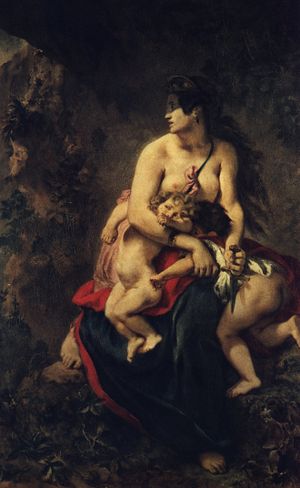Euripides

Euripides lived approximately 480 or 485-406 B.C. He wrote Medea in 431 BCE. He was raised in Athens for most of his life, but also spent much of his time in Salamis. He died in Macedonia, at the court of King Archelaus. It is estimated that he wrote ninety two plays and during his lifetime he won four first prizes during the annual spring festival of Dionysus in Athens.
Euripides compares to Aeschylus and Sophocles in his art. But the difference between the writers was Euripides had an ability to bring the mythological story to the layman or on a human level of understanding and reality. It was during Euripides’ time that the traditional values of the gods were challenged by human intellect and reason. There was also a political and social shift taking place in which woman were beginning to play a more substantial role not only in the theater but in society.
His plays were provocative for the times and were concerned with conflicts that sometimes were disturbing to his audience for example Medea’s killing her children to take revenge on Jason. In traditional Greek tragedy, the women may have been portrayed as strong or solid to the plot but never with the possibility of breaking the traditional mold set by the gods. The gods regulated the social boundaries but with writer such as Euripides not only challenged but perhaps was considered a heretic in the Greek tradition because of his lack of respect for the Greek gods or their boundaries.
Not only did Euripides test the ideas of the day about the gods, women but also about the traditional ideals about men. Jason, for example, is not considered the hero in Medea until perhaps Medea killed her children that forced the reader to have pity on Jason. Jason was not a hero based on the traditional qualities of a hero in literature. Jason compared perhaps to Hector of the Iliad was lacking in character, bravery, and strength. If Hector is our model of a fierce warrior, a family man who was devoted to one woman and courageous in death makes Jason seem a bit deficient in character. The new heroic code that was portrayed by Hector “embodies a new type of humanism. A man is defined as a total being, and not on the basis of one special function, and in which his rights as a member of society proceed from an acknowledgement of that which he had in common with the rest of society, rather than from his particular and special abilities” (Valsillopulos).
Work Cited
- Valsillopulos, Christopher. “Medea and the Reformation of the Tragic Polis.” Social Science Journal (31.4): 1994. 435-
